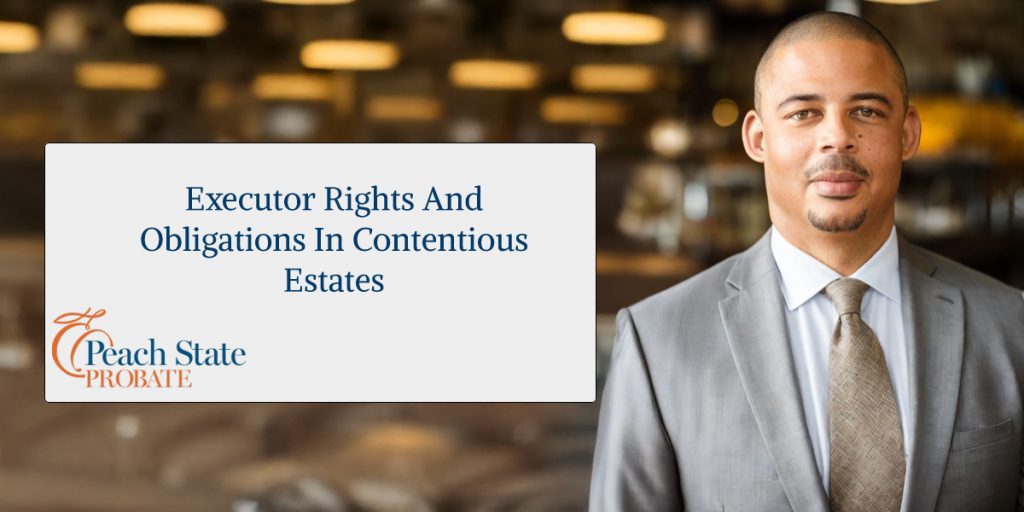## Understanding Executor Disputes in Contentious Estates
Executor disputes arise in situations where the appointed executor of an estate faces challenges either from beneficiaries, heirs, or other interested parties regarding their actions and decisions during the administration of the estate. These disputes can spring from various issues, including disagreements over the interpretation of a will, perceived mismanagement of estate assets, or delays in the distribution of inheritances. The contentious nature of these disputes often complicates an executor’s role, necessitating a clear understanding of their rights and obligations.
The executor, often a trusted family member or friend, is typically assigned the responsibility to carry out the wishes of the deceased, according to the terms of the will. However, the executor’s decisions may sometimes lead to friction among family members or beneficiaries, particularly when emotions run high during a time of loss. Disputes can escalate quickly, resulting in potential litigation that not only prolongs the probate process but also drains estate resources. As such, it is crucial to navigate these disagreements carefully and with legal support.
Executor disputes are not uncommon and can significantly impact the smooth transition of assets to beneficiaries. By understanding the dynamics of these disputes, those involved can better prepare for potential challenges. The next section will dive deeper into the roots of executor disputes, drawing attention to their implications for estate management.
## The Importance of Understanding Executor Disputes
The stakes involved in executor disputes can be considerable, affecting not only the value of the estate but also the relationships among family members and beneficiaries. Understanding the reasons behind these disputes is essential for all parties involved. Disputes may arise from disagreements on financial matters, such as the valuation of estate assets or the appropriateness of certain expenditures related to maintaining the estate during the probate process. Moreover, if beneficiaries feel that they are not being treated fairly or that the executor is showing favoritism, suspicion can lead to significant conflict.
The emotional toll that disputes can take must also be acknowledged. The process of settling an estate can be fraught with grief, and disputes may exacerbate feelings of anger or resentment among family members. Recognizing these dynamics is vital for both executors and beneficiaries, as it can help de-escalate situations before they lead to full-blown legal battles. Understanding the motivations and perspectives of all parties can foster a more collaborative approach to estate administration, albeit challenging in emotionally charged environments.
Acknowledging the importance of discussing disputes early can prevent them from evolving into larger conflicts that require expensive legal intervention. With the right strategies and resources, most disputes can be resolved before they escalate, allowing for a smoother, more respectful transition of estate assets.
## Legal Framework Surrounding Executor Rights and Obligations
The legal framework governing executor rights and obligations in contentious estates is deeply rooted in probate law. An executor has a fiduciary duty to act in the best interests of the estate and its beneficiaries, meaning that they are legally compelled to manage the estate with fairness and transparency. This duty includes accurately reporting estate assets, paying debts and taxes, and distributing legacies as prescribed by the will. Executors must also keep beneficiaries informed about the estate’s progress, which can help alleviate suspicions about mismanagement.
Georgia law grants specific rights to executors, including the authority to make decisions regarding the estate without the need for approval from beneficiaries for routine matters. However, this autonomy is balanced by stringent obligations to provide full disclosure about estate activities and to avoid self-dealing. Violating this fiduciary duty can lead to legal repercussions, including being removed from the position of executor and facing potential financial penalties when beneficiaries file lawsuits for damages caused by mismanagement.
As disputes arise, understanding the legal nuances surrounding these rights and obligations becomes essential for executors. Knowledge of the applicable laws can empower them to act confidently while ensuring their actions remain within the boundaries of legal compliance. Both executors and beneficiaries can benefit from clarity regarding these legal requirements, which may facilitate more constructive communication and conflict resolution.
## Real-Life Scenarios of Executor Disputes
Examining real-world examples of executor disputes provides insight into the types of challenges that can arise during estate administration. One common scenario involves siblings contesting a parent’s will, where one child is appointed as executor and alleged to be favoring themselves over others in asset distribution. Disagreements can stem from interpretations of the will or perceived imbalances in how the estate is managed. Such disputes can escalate into legal battles, causing rifts among family members and prolonging the probate process.
Another example occurs when an executor sells a property from the estate at a price that certain beneficiaries believe is far below fair market value. In this case, beneficiaries may argue that the executor’s actions constitute mismanagement or negligence, leading to claims for damages or requests for the executor’s removal. In these instances, proper documentation and communication become even more crucial to demonstrate the executor’s intentions and actions.
A particularly complex case can arise when a significant asset, like a family business, is involved. The appointed executor may have to navigate conflicting interests among family members who have different visions for the business’s future or how it should be valued. This situation may lead to disputes over management decisions made by the executor, stressing the importance of seeking legal counsel to manage stakeholder expectations and effectively mediate disagreements.
## Proactive Steps for Executors Facing Disputes
For executors embroiled in disputes, taking proactive measures is vital to mitigate conflict and promote cooperative solutions. Establishing clear communication channels with beneficiaries can help clarify intentions and streamline expectations. Regularly updating beneficiaries on the status of probate proceedings can alleviate concerns that may cultivate mistrust. This transparency is particularly important when significant delays occur, as beneficiaries may otherwise assume that the executor is neglecting their duties.
Keeping thorough and organized records of all estate transactions, communications, and decisions can serve as crucial documentation should disputes arise. Executors should use a system that tracks all financial activities, including bequests made and expenses paid, to create an audit trail that highlights their compliance with fiduciary duties. This kind of documentation not only strengthens the executor’s position but also serves as a point of reference for beneficiaries seeking updates on the estate’s progress.
Another proactive step is to be open to mediation when conflicts emerge. Engaging an impartial third party can help facilitate discussions and promote reconciliation among parties before disagreements spiral into litigation. Mediation can lead to a more amicable settlement, preserving familial relationships while achieving a fair resolution to disputes regarding estate management.
## Errors Executors Should Avoid During Disputes
Navigating the complexities of executor disputes requires a careful approach, and certain missteps can exacerbate tensions and lead to further complications. One significant mistake is failing to communicate effectively with beneficiaries. When beneficiaries feel left in the dark, they may progress from uncertainty to anger, resulting in disputes that could have been avoided with timely updates and transparent dialogue.
Another common error is disregarding the legal bounds of their authority. Executors must remember that while they do have discretion in managing the estate, their decisions should still align with the deceased’s wishes as outlined in the will. Overstepping authority—whether by making significant decisions without consulting beneficiaries or reallocating assets—can lead to accusations of misconduct and breach of fiduciary duty.
Lastly, executors should avoid allowing personal feelings to influence decision-making. Disputes often stem from emotional ties, and it can be challenging to act impartially amidst familial conflict. However, maintaining objectivity is crucial. Executors must approach their duties with a commitment to equitable management, ensuring they remain focused on fulfilling the wishes of the deceased rather than appeasing individual family members.
## When to Seek Legal Counsel in Executor Disputes
Determining the right time to seek legal counsel can significantly alter the landscape of executor disputes. Executors should consider engaging an attorney when they find themselves facing allegations of misconduct or when beneficiaries express dissatisfaction with their actions. An attorney’s guidance can help clarify the executor’s rights while providing a framework for responding to disputes effectively. Early legal intervention can also prevent minor disagreements from escalating into costly litigation.
Seeking counsel is also prudent if the executor is unsure of their legal obligations concerning the estate. Given the complexity of estate law and the myriad regulations that govern executor duties, it is essential to have a knowledgeable resource to consult. An attorney can help in navigating specific probate laws in Georgia and ensure all actions undertaken comply with legal requirements.
Additionally, if negotiations with beneficiaries become heated or personal relationships deteriorate due to the dispute, it is vital to seek legal assistance. An attorney can act as an intermediary, facilitating communication and reducing the emotional burdens placed on the executor. This not only restores some separation between personal emotions and the estate’s administration but can also lead to more productive discussions.
## Advantages of Legal Representation in Executor Disputes
Legal representation can provide numerous advantages to executors navigating contentious estates. An attorney who specializes in probate law can offer guidance and support throughout the complex estate management process, helping executors understand their rights and responsibilities while ensuring that they proceed within the confines of the law. With their comprehensive understanding of legal frameworks, attorneys can help executors make informed decisions that align with the deceased’s wishes and minimize the risk of disputes with beneficiaries.
Having an attorney also strengthens the executor’s position in negotiations. An experienced probate attorney can communicate on behalf of the executor, reducing potential conflicts and facilitating discussions that are focused on reaching a harmonious resolution. Furthermore, should litigation become unavoidable, having an attorney who is well-versed in navigating the probate court system can be invaluable in protecting the executor’s interests.
Legal representation can also alleviate the emotional burden placed on an executor. Executors often find themselves torn between their duties and their relationships with beneficiaries, which can lead to considerable stress. By delegating the more contentious aspects of estate management to an attorney, executors can focus their energy on fulfilling their responsibilities without allowing personal dynamics to interfere with the estate’s administration.
## How Peach State Probate Can Assist with Executor Disputes
Peach State Probate offers invaluable assistance to executors facing challenges in contentious estates. Specializing in probate law throughout Georgia, our team understands the intricacies of executor rights and obligations and is prepared to support clients in navigating potential disputes. Our tailored approach reflects the unique dynamics of each situation, allowing for personalized strategies that align with the executor’s goals and the beneficiaries’ interests.
We emphasize communication and transparency, fostering a collaborative environment among all stakeholders. By keeping beneficiaries informed and involved, we work to diffuse potential tensions before they escalate into disputes that may require litigation. Our commitment to proactive problem-solving is aimed at preserving relationships while ensuring that the estate is administered efficiently and effectively.
Peach State Probate’s comprehensive legal counsel extends beyond mere representation. We provide executors with the tools and resources necessary to fulfill their fiduciary duties while ensuring compliance with Georgia probate laws. Our team is dedicated to equipping executors with the knowledge and support they need to successfully navigate disputes, achieving resolutions that protect both their interests and family dynamics.




